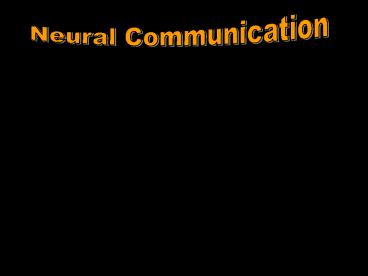Neural Communication PowerPoint PPT Presentation
1 / 27
Title: Neural Communication
1
Neural Communication
2
Electrochemical Signaling
3
Key Terms
- Ion - a charged chemical element
- Electric currents - carried by movements of ions
across membrane of cells - Potential - a force created when ions of opposite
charge are separated
4
Ions In and Around Neurons
- Important Ions!
- Na
- K
- Cl-
- Ca2
- Proteins-
5
Movement of Ions Influenced by...
- Concentration gradient
- Electrical Forces
6
CONCENTRATION GRADIENT
- Difference in concentration of a substance
between 2 locations
A substance will move from an area of high
concentration to low
7
Electrical Forces
LIKE REPELS LIKE
OPPOSITES ATTRACT
8
To understand electrical properties of neurons,
lets look at a resting neuron, one that is NOT
transmitting a signal.
9
Resting Potential (RP)
see fig 4.10
RP - produced by unequal distribution of ions
between inside outside of neuron
10
What is the basis of the RP?
- Distribution of ions
- Na (sodium)
- K (potassium)
- Cl- (chloride)
- An- (other anions)
This uneven distribution sets up concentration
and electrical gradients
11
Selective Permeability - due to ion channels
- Distribution of ions
- Na (sodium)
- K (potassium)
- Cl- (chloride)
- An- (other anions)
Na
K
Na
K
12
Basis of the RP
Fig 4.10
- Selective permeability
- Concentration gradients
- Electrical gradients
- Sodium-Potassium Pump (Na/K)
13
Resting Potential Generation
- Na/K Pump active
- Na channels closed
- K channels open
Na is poised to RUSH in! Thus, RP provides
an ENERGY STORE
14
HYPERPOLARIZATION
Fig 4.11
15
DEPOLARIZATION
Fig 4.11
16
Action Potential
- Active excited firing
- Stereotyped massive depolarization
- Fundamental signaling unit within neuron
- Basis of long-distance signaling
17
Action Potential
- Threshold of Excitation
- All-or-none
- Voltage-sensitive channels
- Refractory Period
- Absolute
- Relative
18
Action Potential
19
Initiation of AP at Axon Hillock
The Soma does not have many voltage sensitive
channels. The Axon hillock has a high density of
them.
20
Propagation of Action Potential
21
Saltatory Conduction
- Node of Ranvier
- No myelin
- High density of voltage-sensitive channels
- Electrical insulation speeds AP from node to node
22
Saltatory Conduction
23
- TTX made from bacteria
- Bocks Na channels
- Death in about 6 hrs
- Tingling, numbness in lips tongue
- Face throat
- Salivation, sweating
- Heart rate temp. drop
- Respiratory distress
- Paralysis convulsion
- Doesnt cross BBB
- No antidote
The Puffer Fish
24
- What causes a neuron to fire?
- How are signals transmitted from one neuron to
another?
25
How is AP triggered?
Synaptic inputs ? Postsynaptic Potentials
Threshold
Sum ? Threshold ? Action Potential
26
Multiple Synaptic Inputs
27
Summation of Synaptic Potentials

